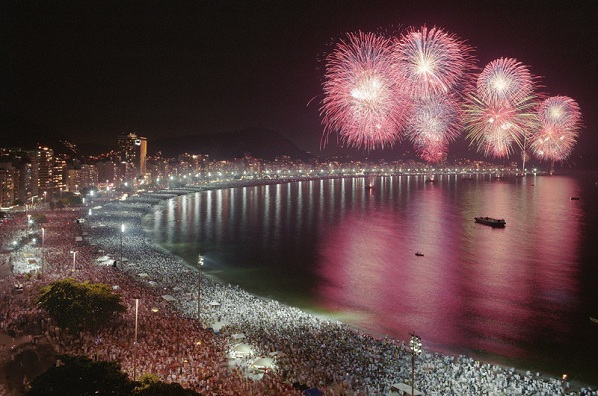Breaking Travel News interview: Paulo Senise, diretor-executivo, Rio Visitors & Convention Authority
 Paulo Senise, diretor-executivo, Rio Visitors & Convention Authority
Paulo Senise, diretor-executivo, Rio Visitors & Convention Authority Breaking Travel News catches up with Paulo Senise, Director Executivo, Rio Visitors and Convention Authority, to discuss the latest developments taking place in Rio ahead of the FIFA World Cup in 2014, and the Olympic Games in 2016.
Breaking Travel News: How are international visitor arrival figures to Brazil and more specifically Rio so far in 2012?
Paulo Senise: International visitor arrival figures to Brazil and Rio have grown 20% last year and 2012 should close with another 10% growth
BTN: To what extent is sports tourism a priority for you?
PS: Sports tourism is a great theme to promote tourism due to its popularity. Rio being a dream destination for so many people around the world and now with a strong calendar of sports events mak it even more attractive to potential new visitors. For this reason we walk hand in hand with the sports sector.
BTN: With major world sporting events set for Rio over the next few years including the FIFA World Cup in 2014, and the Olympic Games in 2016, what impact do you expect this to have on the destination?
PS: Sports tourism impacts positively the tourism sector because of three major aspects:
1) It brings investment to the host city, specially in infrastructure, investment that wouldn´t come otherwise;
2) It is a strong demand driver to the sector as a whole
3) It is gives great visibility to the destination increasing international awareness, way more than the sector could ever afford on its own. The result of all this is
more visitors, more revenue, more employment and a better future.
BTN: What is your goal for international visitors into Rio over this period, given that Embratur has predicted 600,000 extra visitors into Brazil for FIFA?
PS: With the FIFA Soccer World Cup being held in 12 cities, our goal is to have a large percentage of all visitors either arriving or departing via our gateway. We will also be receiving most of the tourists in side trips in between the games in other primary and secondary cities.
BTN: How much money do you expect these visitors will spend in Brazil over that period?
PS: Somewhere around US$1.2 Billion
BTN: What types of infrastructural developments are taking place in Rio to accommodate new visitors?
Rio de Janeiro will receive in 6 years investments in public transport that would normally take 30 year to materialize. There are 4 special express lines for the Bus Rapid Transit (BRTs) covering 140 km in strategic routes plus line #4 of subway systems connecting Ipanema to Barra da Tijuca at an estimated cost of US$8.5.
The international airport will also receive its express BET directly to Barra and from there to further west to Campo Grande and Santa Cruz.
The airport will now be privatised and renovated. Our world famous soccer stadium, the Maracanã is going through a full remodeling to meet the standards of FIFA.
In total, there will be 104 projects taking place at an estimated cost of R$27billion, these include new built facilities and also remodeling.

BTN: How many additional hotel rooms are you planning in Rio over the next few years?
PS: A total of 12,000 hotel rooms of different categories are in the pipeline. It will bring 50 new hotels at a cost of US$2,0 billion.
BTN: Can you reveal the names of any hotel groups who will be opening in the next few months?
PS: New hotels under construction are due to open as of 2013 and include hotel chains such as Windsor, Accor, Hyatt, and also some fully renovated properties such as the Gloria Palace among others.
BTN: How is the airlift situation?
PS: Most airlines servicing Brazil are restructuring their routes to offer a wider range of direct flights to Rio. There are 1.164 international flights per week to Brazil, with 77% of them all concentrated in São Paulo and Rio. These two main hubs are connected to all of the other host cities with direct domestic connections to facilitate distribution.
BTN: Can you describe some of the public and private investment into new museums and attractions in Rio? What projects should we look out for?
PS: One project that stands out is the “Porto Maravilha”, the new harbour of Rio. This will be the largest PPP (Public/Private Projetc) in Brazil, and will attract US$4,5 billion in 15 years and. The project is planned in an area of 850.000 sq mts and will include two hotels, two museums, the referees village, the mídia center, one new convention center and should attract 12,000 new residents to the region.
BTN: What is the planned investment / budget for all the new infrastructure developments?
PS: 80% of the total budget is planned to fund infrastructure : US$11,5 billion
BTN: Which aspects of the Brazil and Rio are you hoping to showcase to visitors over the next few months and why?
PS: We will continue showcasing the calendar of events in a city that was created with the mission to host international visitors, with all its natural attractions and with its increasing supply of facilities and services.
BTN: Which new visitors (markets or demographics) are you targeting?
PS: The US market is our number one, but Europe and Latin America are key sources of international traffic to Rio and we will continue promoting in these markets
BTN: Have you noticed any key global traveller trends emerging?
PS: One sector that will certainly grow in Rio is the Luxury Travel, a long term tourism trend.
BTN: What have you learned from the London Games in the planning and execution of your events?
London did a great job in public communication and signage. This should serve for benchmark to any host city willing to succeed in moving large numbers.
BTN: How has your promotional activity in London gone?
PS: We had a great experience in London. We feel that together with our agency Accumen Marketing we were able to find the right local partner and in 26 locations we were able to promote the image of Rio through a great gastronomic and cultural experience at Las Iguanas outlets throughout the UK.
BTN: What do you expect will be the main challenges ahead in achieving your visitor and infrastructural goals for the next few years?
PS: A lot depends on the economy in international markets. But we believe Brazil is in good shape to accomplish all its goals.

